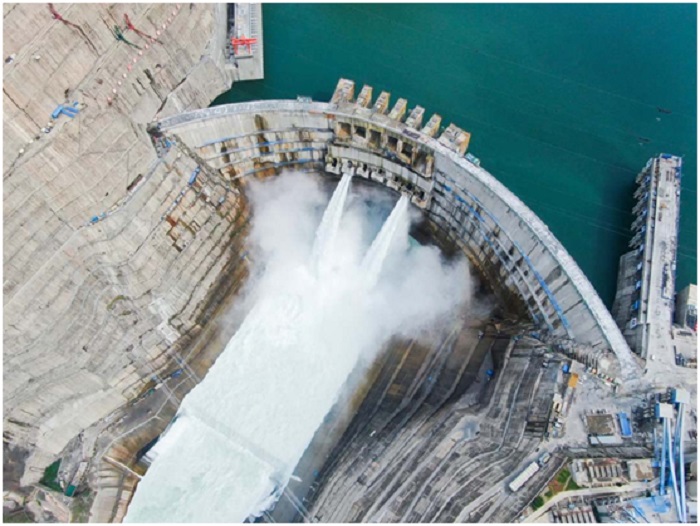



The first batch of generating units of China’s Baihetan hydropower station, the largest hydropower project under construction in the world, were officially put into operation on the morning of June 28.
The hydropower station, which straddles the border between Ningnan county in southwest China’s Sichuan province and Qiaojia county in the neighboring Yunnan province, ranks first and second in the world in terms of single-unit capacity and total installed capacity, respectively.
Located on the dry and hot valley of the Jinsha River, the mega hydropower station faces complicated geological conditions and is the world’s most technically challenging hydropower project under construction.
Involving a total investment of 220 billion yuan (about $34.1 billion), the hydropower station, which has been undertaken by China Three Gorges Corporation, will have a total installed capacity of 16 million kilowatts and be equipped with 16 hydro-generating units independently developed by China, each with a capacity of one million kilowatts.
The water turbines at Baihetan hydropower station have a maximum efficiency of 96.7 percent, and the rated efficiency of the generators exceed 99 percent, representing the highest efficiency indexes of hydro-generating units in the world, according to an executive of Dongfang Electric Machinery Co., Ltd., which has been responsible for the development of the eight generating units to be positioned on the left bank of the Jinsha River.
Each hydro-generating unit of the Baihetan hydropower station is more than 50 meters high and over 8,000 tons in weight. The rotatable part of the generating unit consists of more than ten thousand components, with their weight reaching 2,600 tons.
What is particularly impressive about the mega project is that its first batch of generating units that went into operation on Monday has realized zero counterweight runner balancing after final assembly, becoming the world’s first case of giant hydro-generating units that met owner’s index of high-quality products without the need for a trial run with counterweight and creating a new record in the hydropower industry. The generating units have thus been praised as top-notch products by experts of the industry.
Each hydro-generating unit is comprised of more than ten thousand components and parts, including runner, rotor and the generator shaft, according to Leng Jianhua, head of the project department of Dongfang Electric Machinery Co., Ltd. at the Baihetan hydropower station.
“These components and parts might have a slight difference in weight if not produced with the same machine tool, which could lead to imbalance and deviation in torque, a problem that needs to be solved with counterweight,” Leng said.
The generating units of Baihetan hydropower station have achieved zero counterweight as there is almost no torque imbalance, Leng said, adding that the result means relevant personnel have done a great job in controlling deviations in research and development, design, manufacturing, processing, as well as installation.
The construction of the main part of Baihetan hydropower station kicked off in July 2017. All generating units of the project are expected to be operational by July 2022. Upon completion, it will be the world’s second-largest hydropower station, second only to the Three Gorges Dam project in central China’s Hubei province.
As a major project in China’s west-east power transmission program, Baihetan hydropower station will, together with the Three Gorges Dam project and Gezhouba Water Conservancy Project in Hubei, as well as the Wudongde, Xiluodu, and Xiangjiaba hydropower stations on the Jinsha River, form the world’s largest “clean energy corridor”, which will bear great significance for improving China’s energy mix and advancing the country’s endeavor to realize the goal of peaking carbon dioxide emissions before 2030 and achieving carbon neutrality before 2060.
After Baihetan hydropower station is fully put into operation, the power generated by the hydropower station a day will be enough to meet the need of 500,000 people for household power consumption for a year.
With an annual power generation capacity of over 62.44 billion kWh, the project is expected to save about 19.68 million tons of standard coal a year, thus helping reduce carbon dioxide emissions by 51.6 million tons, sulfur dioxide by 170,000 tons, and nitrogen oxides by 150,000 tons annually.


The Humanitarian Service Diamond Awards has.
A Chinese Company, Inner Galaxy Steel.


The Programme Coordinator, Regulatory, Compliance and.


A Non-Governmental Organization (NGO), Committee for.
The Trustfund Pensions Limited has chided.


The House of Representatives Committee on.
The China General Chamber of Commerce.


Senator Chuka Utazi who represented Enugu.


An Abuja based Legal Practitioner, Ugochukwu.


The African business community in Yiwu,.
Leave a Comment